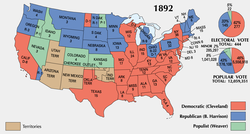James Weaver
|
|
Pd_james_baird_weaver.jpg
James Baird Weaver (June 12, 1833 – February 6, 1912) was a United States politician and member of the United States House of Representatives, representing Iowa as a member of the Greenback Party. He ran for President two times on third party tickets in the late 19th century. An opponent of the gold standard and national banks, he is most famous as the presidential nominee of the Populist Party in the 1892 election.
| Contents |
Biography
Early years
Weaver was born in Dayton, Ohio. His father was a farmer. His family moved to Michigan in 1825, and later established a farm in Bloomfield, Iowa. Weaver studied law in Bloomfield then later at the Cincinnati Law School. He established himself as a lawyer in Bloomfield. After reading Uncle Tom's Cabin by Harriet Beecher Stowe, he became active in the abolitionist movement. After the start of the Union mobilization in the American Civil War, he enlisted as a private in the Second Regiment, Iowa Volunteer Infantry. In 1861 he received a commission as a lieutenant and fought at the Battle of Shiloh. By the end of the war, he had risen to the rank of brigadier general.
After the war he became active in Iowa politics as a member of the Republican Party. In 1866 he was elected district attorney of the Second Iowa Judicial District. On March 25, 1867, he was appoited a federal assessor of internal revenue by President Andrew Johnson.
Weaver became increasingly disechanted with the Republican Party and the presidential administration of Ulysses S. Grant, viewing it as under the control of big business at the expense of farmers and small businessment. He joined the Greenback Party, which advocated an expanded and flexible national currency based on the use of silver alonside gold, as well as an eight-hour work day, the taxation of interest from government bonds, and a graduated income tax. He was elected to the United States House of Representatives in 1878 on the Greenback ticket and served in the Forty-sixth Congress from 1879 to 1881.
Presidential candidacies
He was not a candidate for renomination in 1880, but he was instead nominated as the presidential candidate of the Greenback Party at its convention in Chicago. In the 1880 presidential election, he received 308,578 votes, compared to 4,454,416 for Republican James Garfield and 4,444,952 for Democrat Winfield Hancock. Much of Weaver's support came from the Great Plains and rural West, areas where the Farmers' Alliance was strong. He ran unsuccesfully for Congress in 1882. In 1884 he was elected to Congress once again and served two terms. He was defeated in the 1888 election and left office in 1889.
The Greenback Party eventually merged with the Democratic Party in most states, a move that Weaver opposed. In 1891 Weaver helped found the Populist Party ("People's Party"). In 1892 he was the presidential nominee of the Populist Party and chose a strategy of forming alliances with African-Americans in the South. His policy was not well received by whites in the South and led to violence and intimidation against black voters. In one of the better showings by a third-party candidate in U.S. history, Weaver received over a million popular votes, and won four states (Colorado, Kansas, Idaho, and Nevada) and 22 electoral votes.
In the 1896, he threw his support behind Democrat William Jennings Bryan, who supported many of the Populist Party causes and who subsequently captured the Democratic Party nomination. Weaver had believed that he had struck a deal with Bryan that Tom Watson, who had helped found the Populist Party with Weaver, would be Bryan's running mate. Instead Bryan chose Arthur Sewall, a conservative opponent of trade unions from Maine. As a consequence, many in the Populist Party turned against Bryan and refused to support him in the general election. Bryan was defeated by Republican nominee William McKinley.
The Populist Party went into decline after 1896 and soon disappeared; however, many of its core ideas, such as the direct election of United States Senators, a graduated income tax, and the relaxation of the gold standard, were implemented in later decades, the first two by means of the necessary constitutional amendments.
Weaver served as mayor of Colfax, Iowa from 1901 to 1903. He died in Des Moines, Iowa.
External link
- Biographical Directory of U.S. Congress: James Baird Weaver (http://bioguide.congress.gov/scripts/biodisplay.pl?index=W000225)

